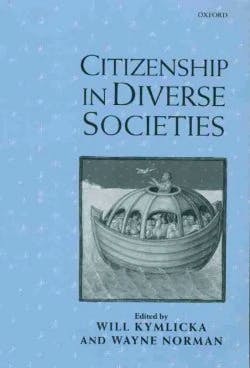Citizenship in Diverse Societies
...excellent collection…fourteen essays written by some of the best and most thought-provoking writers on this subject...
Philip Parvin, Political Studies
Is it possible, in a modern, pluralistic society, to promote common bonds of citizenship while at the same time accommodating and showing respect for ethnocultural diversity? 'Citizenship' and 'diversity' have been two of the major topics of debate in both democratic politics and political theory over the past decade. Much has been written about the importance of citizenship, civic identities, and civic virtues for the functioning of liberal democracies, and the need to accommodate the ethnocultural, linguistic, and religious pluralism that is a fact of life in most modern states. By and large, however, these two topics have been largely discussed in mutual isolation. Much of the writing on the issues of both citizenship and diversity remains rather abstract and general and disconnected from the specific issues of public policy and institutional design. Citizenship in Diverse Societies examines the specific points of conflict and convergence between concerns for citizenship and diversity in democratic societies and reassesses and refines existing theories of 'diverse citizenship' by examining these theories in the light of actual practices and policies of pluralistic democracies.
...this high-quality collection should be read by anyone interested in the issue of multicultural citizenship...
David Miller, American Political Science Review
Table of Contents
-
Introduction
- Will Kymlicka and Wayne Norman, "Citizenship in Diverse Societies: an Introduction"
-
Part I: Citizenship Education and Religious Diversity
- Eamonn Callan, "Discrimination and Religious Schooling"
- Jeff Spinner-Halev, "Extending Diversity: Religion in Public and Private Education"
-
Part II: Political Participation and Group Representation
- Jane Mansbridge, "What Does a Representative Do? Descriptive Representation in Communicative Settings of Distrust, Uncrystallized Interests, and Historically Denigrated Status"
- Melissa Williams, "The Uneasy Alliance of Deliberative Democracy and Group Representation"
-
Part III: Immigration, Identity and Multiculturalism
- Jeremy Waldron, "Cultural Identity and Civic Responsibility"
- Tariq Modood, "Anti-Essentialism, Multiculturalism and the Recognition of Religious Groups"
-
Part IV: Gender and Ethnic Diversity
- Ayelet Shachar, "Should Church and State be Joined at the Altar: Women's Rights and the Multicultural Dilemma"
- Sawitri Saharso, "Female Autonomy and Cultural Imperative: Two Hearts Beating Together"
-
Part V: Language Rights
- Denise Réaume, "Official Language Rights: Intrinsic Value and the Protection of Difference"
- Pierre Coulombe, "Citizenship and Official Bilingualism in Canada"
-
Part VI: The Rights of Indigenous Peoples
- Jacob Levy, "Three Modes of Incorporating Indigenous Law"
- John Borrows, "Landed Citizenship: Narratives of Aboriginal Political Participation"
-
Part VII: Federalism and Nationalism
- Graham Smith, "Sustainable Federalism, Democratisation and Distributive Justice"
- Rainer Baubock, "Why Stay Together: A Pluralist Approach to Secession and Federation"
